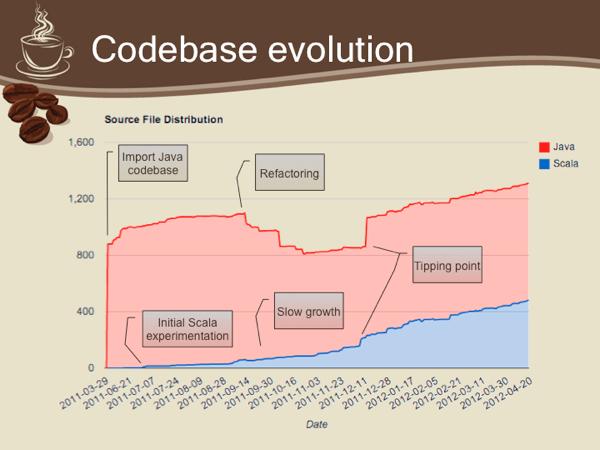This post attempts to summarize and clarify a lecture given at the Botzia (Israeli Java user group) meeting on May 3rd, 2012. You can view the presentation in its entirety on SlideShare:
What is Scala?
Scala is a modern, statically-typed language designed to run on the Java platform. It's commonly perceived as an "evolutionary Java" and with good reason: Scala adds powerful features while significantly reducing Java's verbosity. It is a highly practical language in that it offers a very straightforward migration path for developers on existing platforms: Java developers will feel right at home with Scala, and a .NET developers will not have to give up on a lot of the advantages C# has over Java.
For organizations with a preexisting codebase Scala offers an excellent balance between power and feature set, as well as perfect interoperability with existing Java code: although you certainly don't have to, you can freely use familiar libraries without a hitch, call into existing code and, for the most part, use your existing tool-chain with little or no impact.
Why did we pick Scala?
As mentioned above, Scala offers a very compelling migration path from an existing Java codebase. When we were setting up the new R&D center at newBrandAnalytics, we were already serving paying customers via a complex codebase. A complete rewrite was out of the question as we had contractual obligations, and we had to keep improving the existing product in order to maintain the competitive edge; it became very clear that we needed to maintain the existing codebase and refactor it incrementally.
An additional data point was that our core team members were highly experienced with Java development and quite comfortable with the platform; we also had a distinct preference for statically typed languages, which ruled several alternatives (particularly Clojure) right out. Scala seemed like a great compromise in that it allowed us to maintain and extend the existing codebase while enjoying advanced language features and improved veracity at little or no risk to the product itself.
How should I "sell" Scala to my boss?
"Safe" choice with proven track record: Scala is not an entirely new language, and has reached a maturity tipping point at 2.8; over the last two years the language has been gaining significant momentum, and has a number of strong advocates and success stories, including Twitter, Foursquare, LinkedIn and a whole host of others.
Scala as a better Java: You don't have to go all-in on Scala's advanced feature set, but can instead think of Scala as an improved Java with type inference, closures, advanced collection framework, traits and pattern matching; these features alone will increase your developers' happiness by an order of magnitude, and productivity will see a corresponding improvement.
Less code ⇒ less bugs: Scala code is far more concise than corresponding Java code, an helps the developer focus on the "what" instead of the "how". The resulting code is usually much shorter, clearer and simpler, which in turn helps lower bug count.
Helps hire better engineers: Great engineers not only love working with the latest technologies, but also love practical, incremental improvements to well-respected technologies. Merely saying "we use Scala" will help attract the sort of seasoned, reliable and professional engineers that you most want to hire.
Where does Scala put you at risk?
Learning curve: Although Scala largely derives from Java, it's a whole new language with a lot of features that takes time to master. Don't expect your developers to be productive from day one; instead, provide opportunities for experimentation and encourage iterative development (and yes, give your developers time and mandate to throw away badly written early code and redo their work if necessary). There is actually a lot of material on Scala and an active and vibrant community; specifically, your developers can easily find help (and answers) on StackOverflow.
Rough edges: Scala is fairly new, and consequently a lot of things that you take for granted with Java are not as mature or robust with Scala. IDE support is a moving target: Eclipse and IntelliJ IDEA both have actively developed Scala plugins and both have occasional issues (spurious error highlighting, lackluster performance, wonky debuggers). The common build tools support Scala, but don't play as nicely; for example, only the native build tool (sbt) support incremental compilation. Even the compiler itself is not entirely bug-free, although these are getting very rare indeed. Bottom line: expect occasional problems, and be patient while working around them; even better, encourage your engineers to participate in the community, file bugs and even offer patches where possible.
Production characteristics: While it runs on the JVM, Scala is not Java; there are subtle differences that you should be aware of when maintaining large-scale or highly-available software. Scala generates a great deal of synthetic code, which puts additional pressure on the PermGen space; synthetic stack frames may also exhibit significantly increased stack usage. Scala also creates a lot of intermediate objects at runtime, which results in added eden generation churn. You may want to profile your applications and tune the GC accordingly.
What's the bottom line?

Scala is fantastic. Our team at newBrandAnalytics is remarkably happier with Scala despite the occasional hitches, and I doubt any of us will consider going back to Java given the option. As long as you keep in mind that on the bleeding edge you may get cut, I definitely recommend taking the plunge, with contractors and die-hard traditional enterprises the possible exceptions.